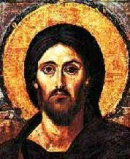Sunday Reflection with Fr Terry Tastard - 21 August 2011

Jesus Panocrator - 6th century, St Catherine's Monastery, Sinai
The gospel today (Matt. 16.13-20) was a hinge moment in the history of the world. Jesus has been teaching and healing. He has done this in the company of a small select group, the disciples. They saw the private Christ as well as the public Christ. If they understood something of who he was, then he was getting through. If, on the other hand, they remained in the dark, then Jesus would have wondered if the good news would be received by anybody at all.
But you, he said, who do you say I am?
It's a crunch question. It puts the disciples on the spot, just as it puts on the spot each person in our world who hears of Jesus. It invites us to choose. It challenges us to commitment. It asks us to declare ourselves publicly. And how our culture hates things like that!
We live in an age of equivocation. Our culture is supremely happy with the reply the disciples give to the first question. Our culture prefers to keep its options open. It loves the reply, Jesus, some say you are X, some say you are Y, some say you are Z.
His next question cuts across all this: But you, he said, who do you say I am?
Do we need to acknowledge Jesus as the Messiah, the Christ, of, as Peter puts it today, the Son of the Living God? Avoiding a declaration has its attractions. Each of us is an explorer, spiritually. We are seekers. Surely there is room for us to be tentative, provisional, open to many interpretations? Alas, seek in that way and you will never find. What Jesus invites us to is commitment. Just as Peter's commitment allowed Jesus to begin laying the foundation of the Church, so, too, our commitment to Christ allows Jesus to build in our lives. It allows God to hope that we will not be here today, gone tomorrow followers.
I was struck in a book on spirituality by an extract about a mountain expedition to the Himalayas. Those who proposed the expedition found that somehow they got nowhere with their plans, until they committed their own money to it and booked their passages to India. Up to that point they had been hesitant, provisional, tentative. From that point onwards things swept forward. The leader of the mountaineers wrote afterwards: 'Until one is committed, there is hesitancy, the chance to draw back, always ineffectiveness … the moment one definitely commits oneself, then providence moves too. A whole stream of events issues from the decision, raising in one's favour all manner of unforeseen incidents, meetings and material assistance, which no man could have dreamt would come his way.' (Quotation from W. H. Murray, The Scottish Himalayan Expedition, in Mark Barrett, Crossing: Reclaiming the Landscape of our Lives, DLT, 2001 p 47). Incidentally, this seems to me to be part of the mystery and magic of marriage too. When a couple commit themselves, it calls forth from each of them new energies, new powers, new possibilities, that would never emerge if they kept their options open.
And so, like Peter and he disciples, we stand before Jesus. We do so at the start of each day. We do so at the start of each eucharist. We stand before Jesus even at certain crossroads in our lives. Jesus asks us, Who do you say I am? And when, like Peter, we acknowledge that he is the Son of the Living God, we find not confinement but freedom. It is an invitation to living in the freedom of knowing God's love for us, and knowing also that God loves the world and asks us to continue the work of Christ, through the grace that he will give us.
Fr Terry is Parish Priest at Holy Trinity Catholic Church in Brook Green, west London. His latest book: Ronald Knox and English Catholicism is published by Gracewing at £12.99 and is available on Amazon, on ICN's front page. To read Sr Gemma Simmonds' review on ICN see: www.indcatholicnews.com/news.php?viewStory=16114















